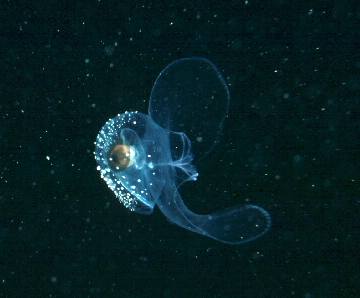How will global warming affect marine food chains?
How will global warming affect marine food chains?
mongabay.com
February 17, 2008
Rising temperatures and acidity of the world’s oceans due to human emissions of carbon dioxide is putting marine food webs at risk warned a researcher speaking at a press briefing at the annual meeting of the American Association for the Advancement of Science in Boston.
Gretchen Hofmann, associate professor of biology at the University of California at Santa Barbara, said that pteropods, tiny organisms that play a critical part in marine ecology, are likely to suffer from higher carbon dioxide levels in the world’s oceans. When carbon dioxide dissolves in seawater it makes increases acidity by stripping out carbonate ions, which are essential for marine organisms like pteropods to build calcium carbonate shells and exoskeletons.
“These animals are not charismatic but they are talking to us just as much as penguins or polar bears,” said Hofmann. “They are harbingers of change. It’s possible by 2050 they may not be able to make a shell anymore. If we lose these organisms, the impact on the food chain will be catastrophic.”
The loss of these small organisms would have a disastrous impact on predators — including salmon, mackerel, herring, cod — that rely on them as a food source and could spell trouble for other species.

The pteropod or sea butterfly is one marine organism that could suffer in more acidic seas. A recent experiment by Victoria Fabry at California State University San Marcos found that the shells of pteropods, when subjected to conditions as projected by the model for the year 2100, rapidly dissolved. Photo courtesy of USGS. |
Hofmann says that while invertebrates can adapt to increasing acidity, “re-tuning” their metabolism to make a shell in more acidic waters comes at a cost: “The physiological changes that are a response to the acidity make the animals less able to withstand warmer waters, and they are smaller,” explained a news release from the University of California at Santa Barbara.
“These observations suggest that the double jeopardy’ situation —— warming and acidifying seas —— will be a complex environment for future marine organisms,” she said.
Warming could bring sharks to Antarctica with devastating ecological consequences
Global warming could make the waters around Antarctica hospitable to sharks for the first time in 40 million years. Their return could have devastating ecological consequences report researchers from the University of Rhode Island.
This article is based on a news release from UCSB







